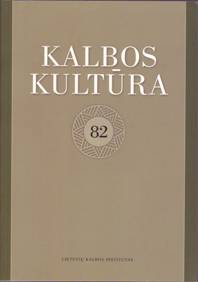Daugiskaitinių ir vienaskaitinių kreipimosi formų konkurencija viešojoje sakytinėje vartosenoje
Competition between plural and singular forms of address in public spoken usage
Author(s): Jurgita GirčienėSubject(s): Sociolinguistics
Published by: Lietuvių Kalbos Institutas
Summary/Abstract: A quantitative analysis of television talk shows representing public usage and broadcasted between 26 January 2009 and 11 March 2009 has identified a marked preference for the polite form of address, which is usual in this area of usage: different addressors referred to 248 different addressees by the polite plural form jūs and only to 43 different addressees by the less polite singular tu. A qualitative analysis has identified differences between programmes dealing with public issues (PPI) and programmes focusing on entertainment and/or personal issues (PEI).PPIs are related to public official usage and therefore consistently use plural forms of address which help maintain social distance. PEI, in their turn, are mostly related to freer public usage, hence singular forms of address which help maintain friendly relationships compete with plural forms of address. Both of them are equally popular (jūs found in 57 instances; tu—in 42 instances). A different character of PPIs and PEIs determines differences in the choice of their participants and in addition to the previously discussed aspects of official and free usage might also influence the choice of the forms of address.The main socio-linguistic factors determining the choice of the forms of address in PPIs include the age of the addressor and the addressee, closeness between them, social roles which might be influenced by education and social status. The plural form in PPIs is mostly used when addressing older, more respectable participants, often performing the roles of decision takers or experts. The singular form is preferred by moderators, used in reference to peers, younger interlocutors or acquaintances. It should be noted that PPI moderators attempting to combine public and private sometimes have to cope with rather tough situations, for example,by linguistic means, including polite forms of address, they have to create a friendly environment and show respect to their guests and the audience.
Journal: Bendrinė kalba (iki 2014 metų – Kalbos kultūra)
- Issue Year: 2009
- Issue No: 82
- Page Range: 214-234
- Page Count: 21
- Language: Lithuanian

